French version : Link
Who is Maurice Berger
Maurice Berger is a French psychiatrist and psychoanalyst. He was trained in adult psychiatry in 1975 for and child psychiatry in 1977. He was associate professor in clinical psychology and also a teacher and trainer of the College of group and family psychoanalysis. In 1989, he became head of the department in psychiatry child at the Saint Etienne Hospital.
He has participated in several working groups on child protection including one at the request of Christian Jacob (Minister of Family from 2002 to 2003), another at the request of Marie-Josée Roig (Minister of the family in 2004), and Philippe Douste-Blazy (Minister of Health and Family Welfare from 2004 to 2005). He was member of the board of the Fondation pour l'Enfance (Foundation for Childhood) from 2004 to 2012.
He was heard by a number of parliamentary committees since 2004, 12 times by social affairs in 2004 and in 2007 on the subject of shared custody. He is also the author and or a contributor of 19 books, 107 articles and 33 anthologies. He regularly puts forward the fact that he is entitled to conduct "research". Lastly Maurice Berger has also given lectures at the National School of Magistrates of Paris.
The disagreement between psychoanalysis and developmental psycholog
When parents separate, professionals on mental and child health disagree on the most appropriate formula regarding the accommodation of children, especially if they are young. Should the children stay with their mother or should they continue to enjoy the love and benefit from education they were used to receive from both parents?
Unlike psychoanalysis, developmental psychology is based on scientific bases. Developmental psychologists and especially those who have closely studied the behavior and well-being of children after their parents’ separation, find that children in alternating residence generally are doing better (better results at school and better self-esteem compared to others) than children in traditional care (custody awarded to one parent and reduced interaction with the other, generally the father).
Psychoanalysts, especially those who remain attached to the theoretical dogmas of the masters (Freud, Lacan, etc.), contest the objective observations and the scientific findings based upon them. They continue to advocate for a presumption of full custody awarded to the mother. Some extremists call for strictly prohibiting shared custody for children under 6. According to them, children must at all costs remain with the so-called "primary parent" until that age. These psychoanalysts use the term "primary parent" to suggest there is a hierarchy in parenting. However, this hierarchy is normative. But in the real life, both parents generally contribute together to the education and loving care of their children.
The alleged Brazelton schedule
In May 2014, a number of psychoanalysts organized an online petition to violently disrupt the debates by the French National Assembly on the "family" bill. In this petition, to collect a larger number of signatures, they made a number of misrepresentations: they claimed the "family" bill would make weekly alternating residence compulsory for all children whatever their age; they argued that shared custody had been proven to be harmful to children and claimed that many countries had reversed their way on the matter. For example, they misrepresented the "cases" of California. In fact, this state has never done any back towards turn on alternating residence. To conclude, they demanded the application by French courts of the "Brazelton calendar", "amended by Maurice Berger and Jacqueline Phélip" for children under 6 in case of parental separation.
The purpose of this calendar is to ensure that the child can make the most of his "primary parent" and at the same time organize occasional meetings with the father. For example, for a child whose age is between 0 and 2 years old, the so-called "modified Brazelton calendar" recommends the following organization: "the child could meet his father two to three times a week without spending the night home for a period of two or three hours twice a week until the age of six months and then three times for a period of three hours. Two of these half-days could eventually be merged in a single full day approaching the age of twelve months. The problem is that of the place when the 2 homes are far away from one another: It is then necessary to find an uninvolved third party in the conflict if there is a disagreement about accommodation: with a grandparent, a mutual friend, the nanny. One might suggest that in the future, this may take place at the nursery / child-care center in a space especially devoted to this purpose on a legal basis".
While such psychoanalysts have no objection when children are handed over to child-care centers or to nannies, when the mother is absent because of her job for example, they believe children should have no more than two three-hours meetings a week with their dad to feel their love and receive their education.
The psychoanalyst Maurice Berger explains that the Calendar "is specifically intended to conflict situations, and aims to meet a precautionary principle for the development of the child. This calendar is directly inspired by the work of Brazelton and Greenspan ... ".
In May 2014, a number of French media were abused by such impressive references and mentioned, without verification, the so-called "Brazelton Calendar" as a possible "solution". Today (October 2015), typing "Calendrier de Brazelton" in French in a search engine on the internet brings up no less than 8130 references.
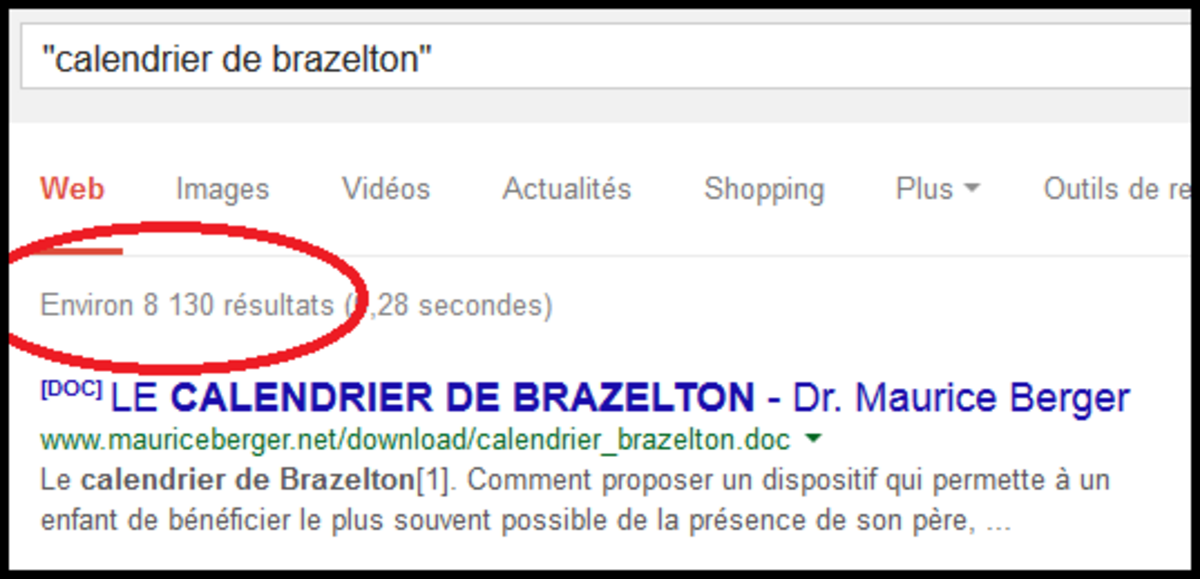
Yet, when we search for this same schedule, coming from the US, with key words in English: "Calendar of Brazelton", "Schedule of Brazelton", "Brazelton Calendar", "Brazelton Schedule", "Brazelton's Calendar", "Brazelton's Schedule", etc. the same search engine will return 0 results.
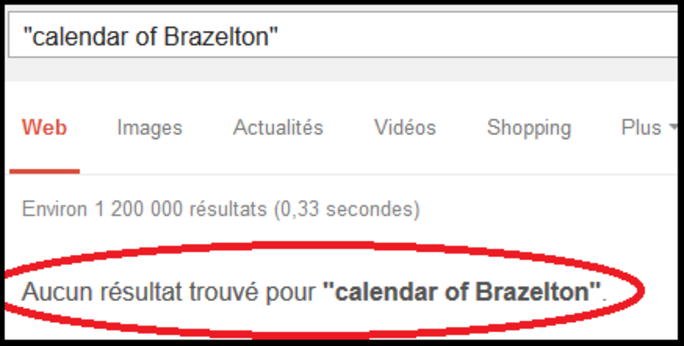
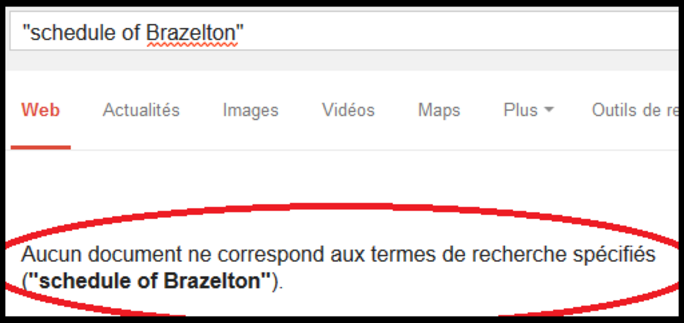
Please find below snapshots showing Google search results in various languages: Spanish, Italian, German, Dutch, Norwegian, Swedish, Danish, Portuguese, Finnish, Icelandic, Arabic, Korean and Hungarian. Since Dr Thomas Berry Brazelton is extremely well known and respected internationally, you would believe that a Calendar or Schedule he would have promoted would have gained some notoriety and perhaps even be in use. Yet, it appears that despite our best efforts we have been unable to find any reference to it in any other country besides France. The reader is invited to do his own local research in his own language to check for references to a "Brazelton calendar" or "schedule" (not "scale" which refers to a major contribution of Dr Brazelton but on a completely different subject) and to report such findings. To the best of our knowledge, Maurice Berger has written the only books that make any reference to the "Brazelton calendar". We dare to add that these books are not precisely scholarly publications. More to the point, Dr Berry Brazelton has never written any book using this expression, nor has he ever written any book or article on the specific issue of parent separation.
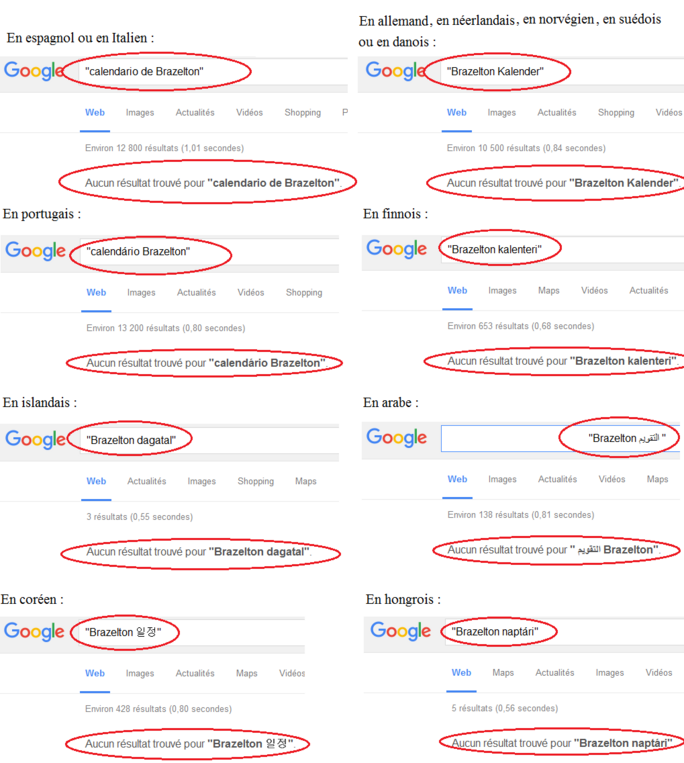
Agrandissement : Illustration 4

The explanation is very simple ... This calendar: "by Brazelton" (or to be specific "calendrier de Brazelton") does not exist and never existed! Thomas B. Brazelton never created such a calendar! Brazelton Institute has never even heard of it (see the response of the Brazelton Institute below: screenshot of an email received from an official of the Brazelton Institute)! The name of this famous pediatrician, internationally renowned Thomas B. Brazelton was simply used inappropriately (I will explain how it took place below) to mislead the media, doctors, politicians and all of French society!
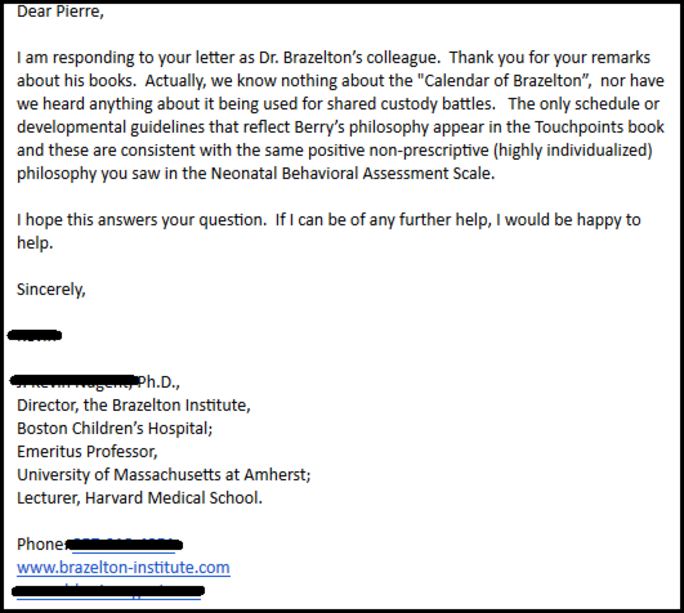
An inappropriate reference to Brazelton
Thomas B. Brazelton is an internationally famous US pediatrician. He has written on numerous subjects relating to children but has never done any research or written any scientific publication concerning modes of residence of children in case of parental separation. With all due respect, his possible and occasional opinions on the matter cannot be considered to trump the overwhelming findings on the subject made by genuine North American experts such as: JB Kelly, RA Warshak,R. Bauserman, L.Nielsen, W. Fabricius, D. Paquette,E. Kruk, ME Lamb, etc. or to those of French specialists who are: Gerard Poussin ,Chantal Zaouche-Gaudron, among others. These scientific psychologists are all internationally renowned. They regularly publish the results of their research on the behavior and well-being of children of separated parents in specialized peer reviewed scientific journals. All of them observe that children in alternating residence generally do better than those in primary custody to one parent (father or mother).
But in fact, Thomas B. Brazelton and Stanley I. Greenspan simply collaborated on the writing of a book entitled: "The Irreducible Needs of Children - What Every child must have to grow, learn and flourish" published in 2000. This book was translated to French in 2001 by Isabella Morel. The French version is titled: "Ce qu'un enfant doit avoir - Ses sept besoins incontournables pour grandir, apprendre et s'épanouir". The book is intended to a general public of non-specialist readers. It is not a scientific publication.
In this book, Thomas B. Brazelton and Stanley I. Greenspan write with nuance and reason about the children of separated parents. They are much closer to common sense than the claims of some French psychoanalysts like Maurice Berger.
On page 45 (French version), Stanley I. Greenspan writes that in case of parental separation, it is quite possible for a baby of divorced parents to sleepover in another home: "When divorcing parents live near one another and are good parents, I recommend them to keep a child with a relationship as close as possible to what it was during their marriage life. The ideal is that both parents can see the child daily. The child will feel safe and comfortable with each parent. If they both spend a lot of time with him and know how to give the child a feeling of security (for example, if the baby leaves either one or the other parent console him when upset), then we can start fairly fast to let him go for the night".
It is clear that Stanley I. Greenspan and Thomas B. Brazelton are very careful to preserve emotional ties the child may have developed with both of his parents and that the issue of residence should take this consideration in due place. Recommendations from Stanley I. Greenspan and Thomas B. Brazelton therefore radically differ from the categorical and dogmatic position claimed by Maurice Berger.
In their book, Stanley I. Greenspan and Thomas B. Brazelton make no recommendation on a possible prevalence in favor of a type of care. Instead, they advocate the implementation of "parenting plans ". For them, the type of care (i.e. the parenting plan) depends only on the quality of the parent-child relationship. The frequency and duration of visits are primarily defined according to the age of the child and its adaptability. Their recommendations are obviously full of common sense, but it must be noted, however that they forget to consider the perverse use that may be made by the custodial parent in the usual sabotage of the relationship of the child with the other parent to defeat the parenting plan. Therefore, the recommendations of Stanley I. Greenspan and Thomas B. Brazelton really work if there is a perfect understanding between the parents.
Also note the position of Stanley I. Greenspan and Thomas B. Brazelton on the introduction of children in the nursery/ child care center (see page 50 of their book). These specialists are not very favorable to the development of an infant in nurseries / child care center, but it is neither because it would induce a change in the place of the child's life and thus a kind of alternate residence, nor it is in relation to the absence of the mother or of its major attachment figures, but simply because on average the quality of their nursery staff seems relatively insufficient. This reason has nothing to do with attachment, or a change in home which are the primary reasons that M. Berger puts forward to justify a very hostile position towards shared custody.
Through this illustration only (on page 84) Maurice Berger and Jacqueline Phelip want to draw Dr Brazelton in their camp by pretending the schedule is Dr Brazelton’s original work. This is clearly untrue as demonstrated by our correspondence with the Brazelton institute below.
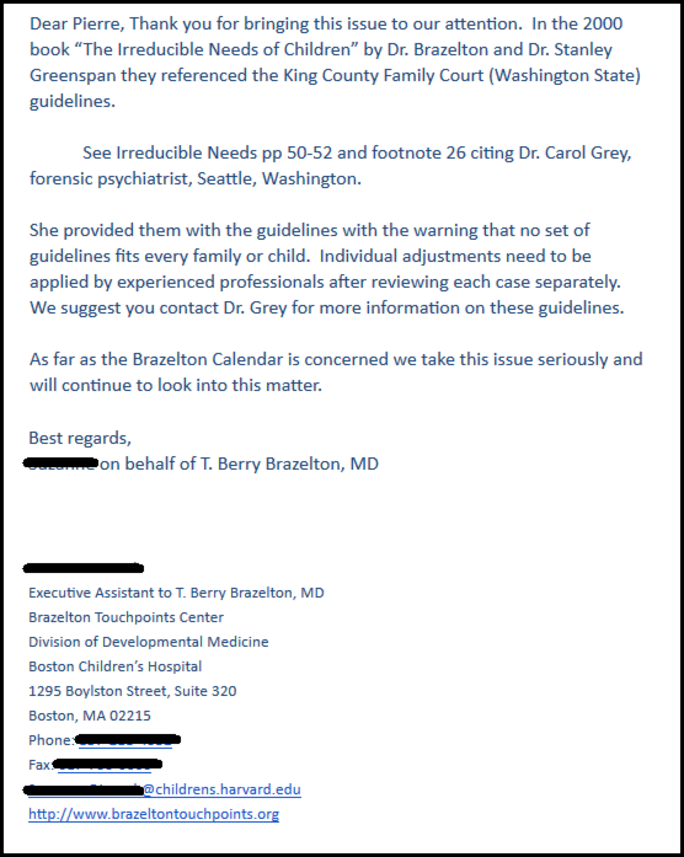
Agrandissement : Illustration 6

There is a prudent caveat on page 84 of Greenspan and Brazelton’s book which states immediately under "Guidelines for visitation: joint custody" that "No model can fit all families". There is also a note (26) "These guidelines were kindly provided by Dr Carol Grey, forensic psychologist in Seattle, Washington." (Confirmed in our correspondence, screenshot attached). It is therefore very clear that Dr Brazelton did not create this "calendar". More importantly, those who use the Brazelton name in reference to such a "calendar" do so without any permission however tacit. Given that they claim to be "experts", "capable to direct research", etc. it is quite legitimate to wonder about the reason for this process which can hardly be represented as best academic practices.
Who benefits from this curious process?
Mr. Brazelton never considered himself as a divorce specialist and therefore never wrote a scientific paper on the subject. No serious academic would build a thesis based on a single excerpt from a book intended for the general public, without mentioning it is a secondary or even tertiary source accompanied by caveats and clearly not an assumed thesis! Yet this is exactly what Maurice Berger did. He took the shortcut and invented the "Brazelton calendar" to imply a well thought out recommendation voluntarily presented by the much respected doctor. This deceptive process had a very pernicious effect in the French press for years and disrupted the proceedings of the "family" bill in May 2014. To make things even more confusing, Maurice Berger promotes the Calendar by saying it has been amended by Mr. Berger, which seems to imply that there was some collaboration between Dr Brazelton and himself.

The confusion is particularly malignant as Dr Brazelton is always cautious and repeatedly recommends a case-by-case approach while Maurice Berger is much more prescriptive and pushes for a systematic application in order to respect a principle of precaution.
If the truth is not restored and that this timetable were to be applied in France, Mr. Berger would win an undue prestige. The pedo-psychoanalytic fraternity will strengthen even more its negative influence on family court judges and it will cut the progress made by developmental psychology. This lobbying psychoanalysis on court decisions has already suffered too many families [1].
Conclusion
Although psychoanalysis is not scientific, judges are mostly trained and supported in their decisions by psychiatrists practice. In France, 70% of psychiatrists are psychoanalytic practice orientated. Under their influence, the decisions of family justice cause much suffering. About 1,000 fathers commit suicide every year due to the loss of their emotional bonds with their children [2]. This is just a partial illustration of children’s pain and tremendous difficulties to adjust when their father is absent:
- 71% of high school dropouts children have no father [4],
- 90% of children who run away do not have a father [4].
To quote psychoanalyst Françoise Dolto [5] : "It is in the order of thing that a father does not care for his baby child : it is not the role of a man. ... / ... This is when the child reaches the age of walking - at eighteen months - that normally manly men begin to take care of him. Those who care for the babies are generally largely femininity marked and, so tare jealous that it is the mother that carries babies in their womb. I think it is very important for the future of children of divorced or separated parents, in neutral places,that doctors help children to understand this saying which is not verbalized and but said by the body say that is a body .".
By "doctors" one must clearly understand: "child psychoanalysts” like her !
French version : Link
------------------------------------
[1] Pierre Laroche – Le lobbying de la psychanalyse sur les décisions de justice familiale – Janvier 2014 : Link
[2] Travaux préparatoires à l’élaboration du Plan Violence et Santé en application de la loi relative à la politique de santé publique du 9 août 2004 - Docteur Anne TURSZ - Mai 2005 - approuvé par le Ministère de la Santé et des Solidarités – Vers la page 71 : Link
[3] Quand la séparation des parents s’accompagne d’une rupture du lien entre le père et l’enfant : Link
[4] Rapport de recherche du Professeur Edward Kruk. : Link
[5] Françoise Dolto - Quand les parents se séparent - page 53.



